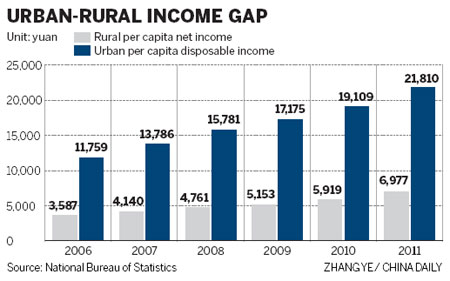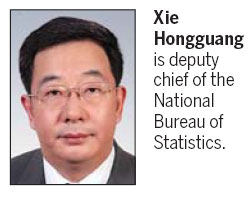Wealth gap survey to be published
Updated: 2012-02-07 09:25
By Chen Jia (China Daily)
|
|||||||||||
|
|
"The nationwide survey, which will provide basic data for China's Gini coefficient calculation, will cover about 140,000 urban and rural households, and the gathering and use of data will conform to international standards," Xie Hongguang, deputy chief of the National Bureau of Statistics (NBS), said.
The integrated urban-rural income data is scheduled to be published in 2013 to pave the way for the publication of a national Gini coefficient that can measure income inequality, Xie said.
The survey will be part of the Sino-Canadian statistics cooperative program. Statistics Canada has shared its experiences in collecting and processing data, Xie said.
Since 2000 the NBS has published a Gini coefficient that focused on rural income and that stood at 0.3897 in 2011.
The coefficient measures income distribution on a scale of zero to one. A reading of zero means perfect equality, everyone earning the same amount, while one represents the greatest inequality.
A reading of between 0.3 and 0.4 indicates a relatively reasonable income gap while an index between 0.4 and 0.5, signals a larger income gap.
Ma Jiantang, NBS chief, last month cited incomplete data on high-income groups as the main reason for the failure to provide a national coefficient.
China had 960,000 millionaires with more than 10 million yuan ($1.58 million) in personal wealth in 2010, a rise of 9.7 percent over the previous year, the Hurun Research Institute and GroupM Knowledge reported in 2011.
Income surveys for urban and rural residents are currently carried out separately. The urban survey covers 66,000 households while the rural one covers 74,000 families.
The per capita disposable income of urban households last year was 21,810 yuan, while the per capita net income of rural households was 6,977 yuan.
The World Bank estimated that China's Gini coefficient had reached 0.47 in 2009, higher than the internationally accepted threshold of 0.4, which indicates income inequality may threaten social stability.
Yi Xianrong, a researcher with the Institute of Finance and Banking under the Chinese Academy of Social Sciences, suggested that the government introduce regulations to ensure the transparency of income information.
"The public have a right to know the Gini coefficient," Yi said.
Wu Muluan, a researcher with the City University of Hong Kong, said that more high-quality statistical data can "help enhance rational decision-making and achieve the maximum welfare of society".
More projects
Another international project that the NBS is involved in is the International Comparison Program (ICP) that started last year, Xie said.
The ICP collects prices of goods and services to calculate the purchasing power of different currencies. It helps compare the output of economies and the welfare of their inhabitants in real terms allowing adjustment for different price levels.
"This is the first time that China officially joined the ICP. We have the capacity to collect and process data according to ICP requirements," Xie said.
"So far it is going well and the results are expected to come out in 2013."
In addition, the NBS plans to start more cooperative programs with the Federal Statistical Office of Germany to improve the gathering of industrial statistics.
"We will also improve communication with statistical institutions in emerging countries, including Russia, India and Brazil," Xie said.
The NBS provides regular data, including figures on population, energy and consumer prices, to more than 20 global institutions.
"As China is playing an increasingly important role in the world's economy, many international organizations are paying more attention to our economic statistics," Xie said.
 |
Related Stories
Need to narrow income gap 2011-09-16 08:01
Wealth gap 'widely felt' in China 2011-12-08 15:43
Wealth gap 'widely felt' in China 2011-12-08 16:19
US wealth gap between young, old is widest ever 2011-11-08 08:02
- China growth estimate for 2012 cut to 8.25%
- Retailers set for difficult times ahead
- Airlines told not to pay EU green tax
- Citi OKed to launch credit cards in China
- DBS launches local subsidiary in Taiwan
- China may become EU's biggest market
- Funding guaranteed for affordable housing
- CNPC operates 16m cubic metre fuel storage









